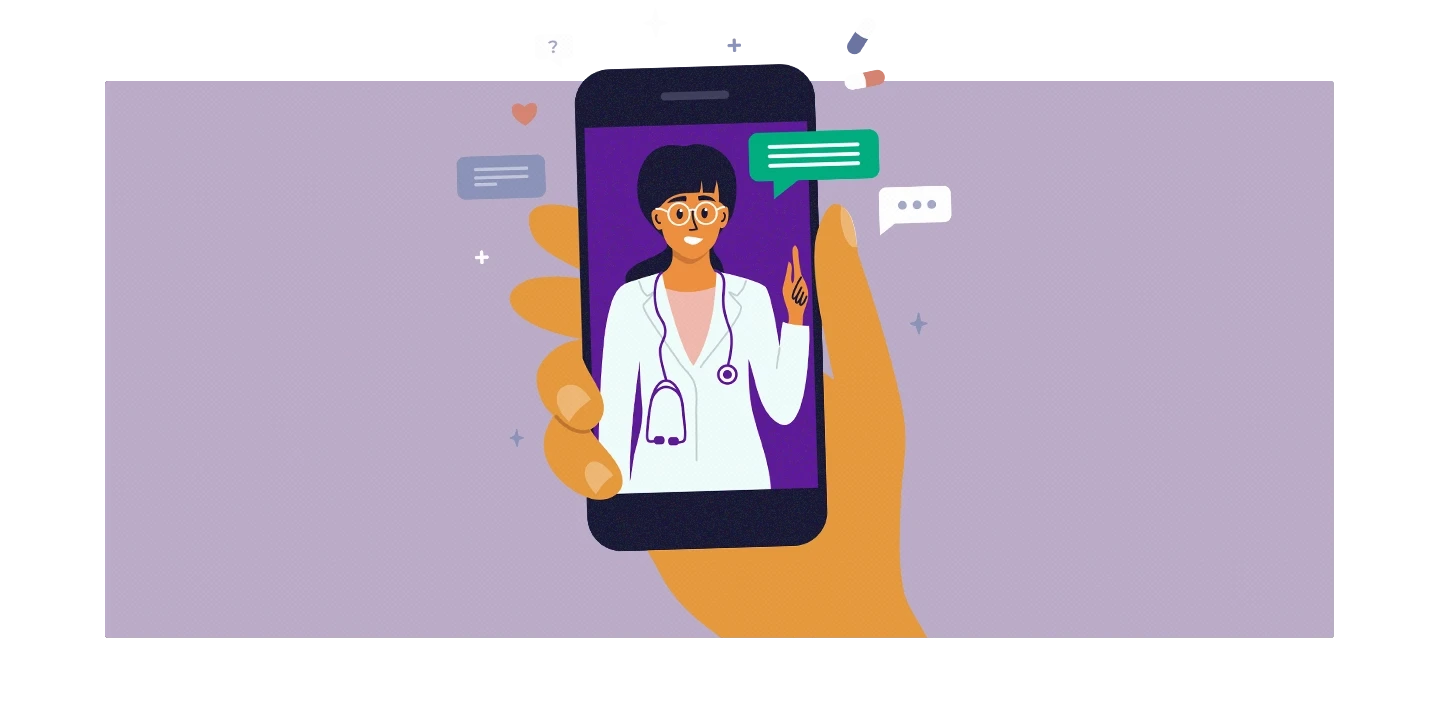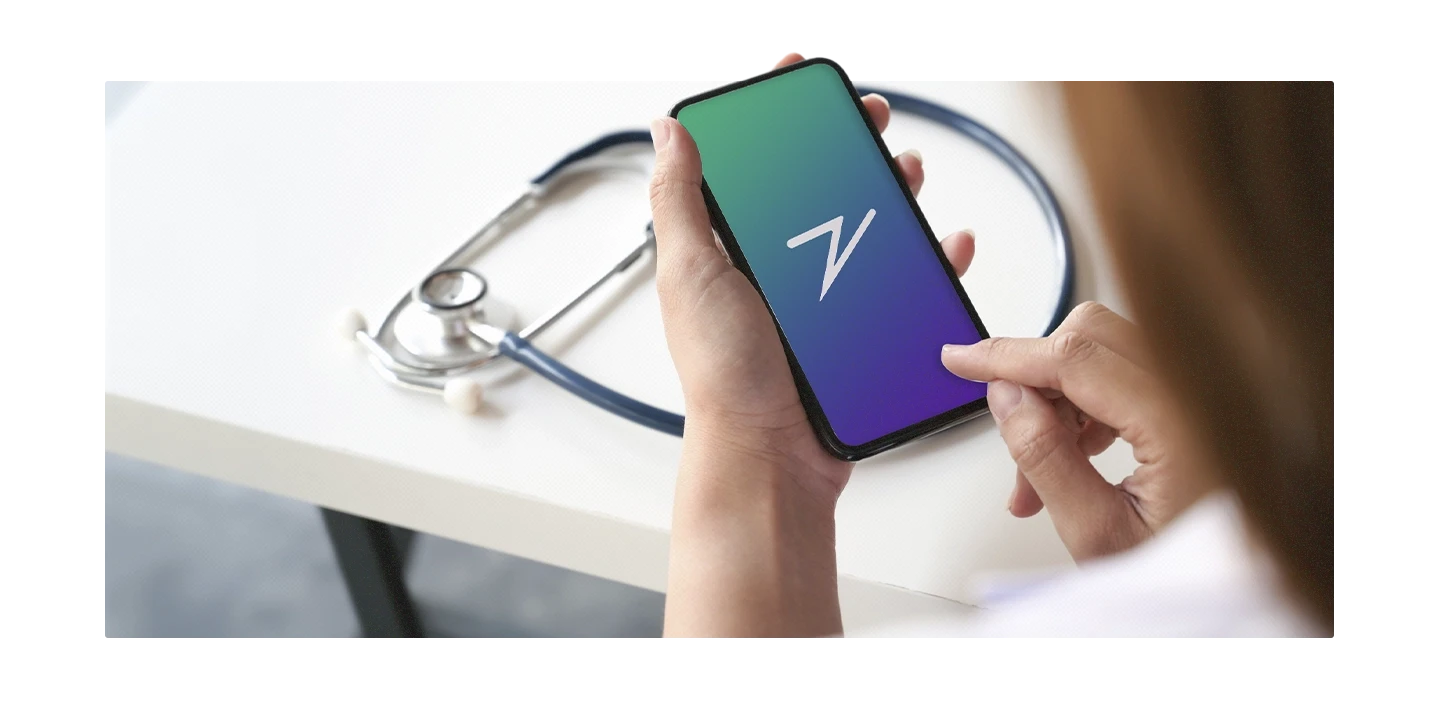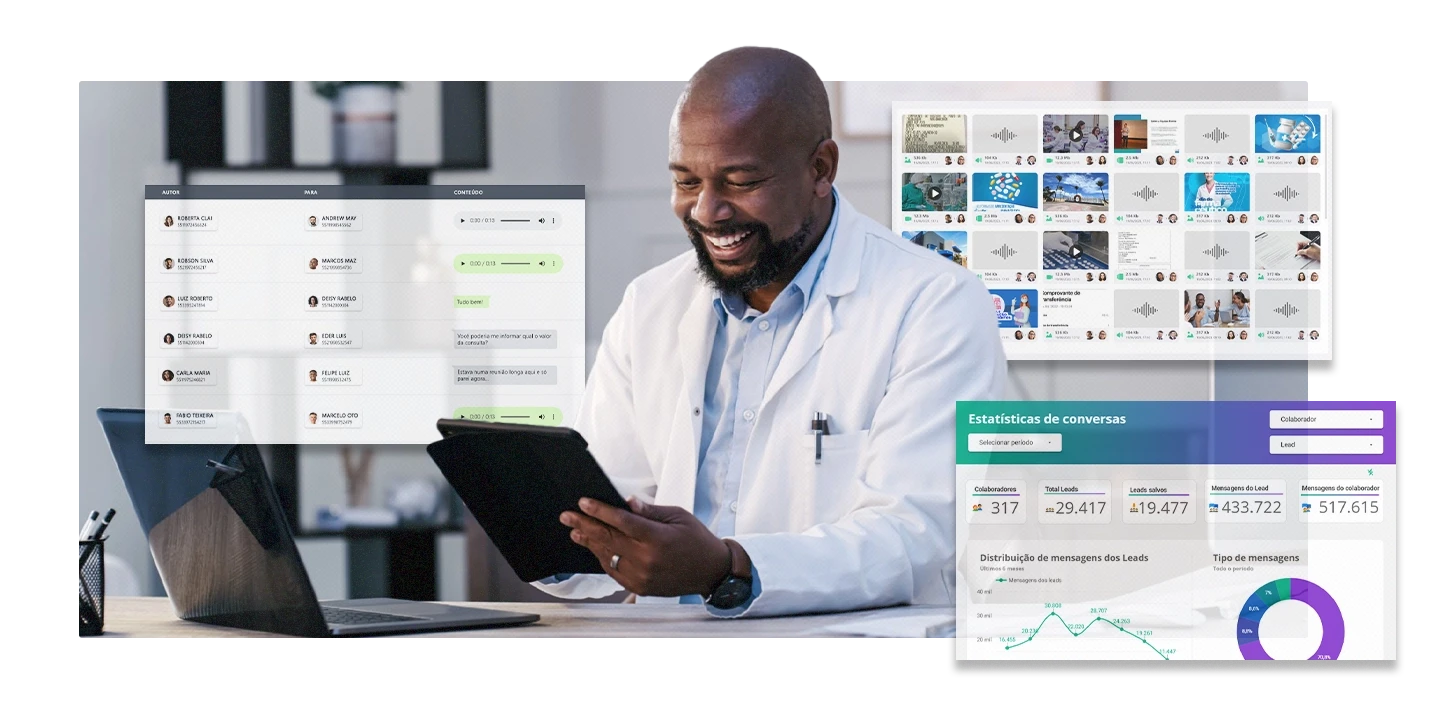
October 17, 2024
Privacy in medical conversations on WhatsApp
How the app monitoring protects communication with patients.

October 17, 2024
Privacy in medical conversations on WhatsApp
How the app monitoring protects communication with patients.

October 17, 2024
Privacy in medical conversations on WhatsApp
How the app monitoring protects communication with patients.
It is difficult nowadays to communicate with anyone without resorting to WhatsApp. The app is ubiquitous in all our lives, and even dialogue with companies and healthcare professionals is conducted through messages via the app.
With the pandemic, the digital relationship between doctors and patients accelerated, and from that moment on, telemedicine became popular, as did scheduling appointments, sending personal documents, and receiving test results via WhatsApp.

Although these activities are now widely carried out via the app to expedite processes and make users' lives easier, it is important to remember that WhatsApp was not designed for the secure sharing of such data. End-to-end encryption minimizes the risk of message interception by third parties but does not prevent the disclosure of conversations!
The use of WhatsApp in conversations between doctors and patients is risky due to the legal implications arising from this conduct, but with some precautions, it is possible to safeguard data security. Shall we check the procedures to formalize communication through the platform?
Also read: Is your company's WhatsApp really secure?
Best practices for communication between doctor and patient via WhatsApp
The General Data Protection Law (LGPD) classifies health information as sensitive personal data, therefore it is mandatory to respect the principles of this legislation. According to it, in the case of sharing medical data with other professionals via WhatsApp, the patient must be notified so that they authorize such communication through the app.
Also read: LGPD and WhatsApp: What You Need to Know
These guidelines should be part of the strategies for a digital care journey that healthcare companies, in particular, must adopt. In this context, sending tests and prescriptions via the app is not recommended, except in extreme cases of urgency and the impossibility of travel.
It is also discouraged to discuss the patient's case with other doctors via WhatsApp, whether individually or in groups. Another point of extreme importance is that even when the doctor-patient relationship is close, the app should never be used to replace in-person consultations or diagnostic complementation.

We know that many professionals and healthcare companies already comply with these rules, but with the increase in interactions via WhatsApp, it is expected that some incidents will occur, putting at risk the credibility of medical services provided and the lives of patients. Therefore, monitoring conversations via the app becomes essential.
Monitoring conversations via WhatsApp
Complaints to regulatory bodies, civil appeals in court, compensation for material and moral damages, application of fines, and damage to reputation and credibility are some of the consequences faced by institutions and healthcare professionals due to the absence of security policies regarding the confidential data of their patients.
If maintaining communication via WhatsApp is fundamental for business, managing that interaction should be the top priority in organizations in general.
Monitoring corporate conversations via WhatsApp and handling private data are protocols that not only minimize the chances of leaks of sensitive information but also allow for oversight and analysis of operational procedures, improving internal and external communication.
Also read: Main doubts about monitoring corporate WhatsApp
Today, the market already has a solution for monitoring interactions via the messaging app that also securely stores dialogues and allows for the creation of qualitative reports about the conversations. We are talking about Zapper, a Brazilian platform that is unprecedented in Latin America.
With Zapper, the communication manager can monitor the progress of dialogues via corporate WhatsApp in real time and, based on the registration of keywords, be notified about their occurrence in interactions, thus indicating suspicious dialogues. This practice allows for immediate intervention in conversations, ensures the quality of information, and prevents misconduct.

All conversations are captured in full by the platform, even if someone attempts to delete parts of the messages. User disconnection is also reported to the manager, who can quickly request reconnection, preventing dialogues from going unmonitored.
Text content, along with image, audio, and video files, are stored in the cloud indefinitely, with exclusive access for the person responsible for information security. This enables future verification and even the use of data to establish evidence in legal proceedings.
Also read: Why backing up WhatsApp is vital for business?
Once the data is collected and stored, Zapper also offers a content analysis feature and report creation, according to the goals of the company's departments. This way, it is possible to check service performance, peak interaction times, main queries, identify operational and logistical problems, and gain strategic insights for the business.

Also read: Transform data into decisions with the help of WhatsApp
As we can see, the security of communication via WhatsApp between doctors, healthcare institutions, and patients goes beyond mere care with message transmission. It requires intelligence and innovative technology solutions, values delivered by Zapper.
Count on us to formalize your company's WhatsApp and ensure the quality and security of interactions on this platform!
Click here to schedule a demonstration of the tool.
It is difficult nowadays to communicate with anyone without resorting to WhatsApp. The app is ubiquitous in all our lives, and even dialogue with companies and healthcare professionals is conducted through messages via the app.
With the pandemic, the digital relationship between doctors and patients accelerated, and from that moment on, telemedicine became popular, as did scheduling appointments, sending personal documents, and receiving test results via WhatsApp.

Although these activities are now widely carried out via the app to expedite processes and make users' lives easier, it is important to remember that WhatsApp was not designed for the secure sharing of such data. End-to-end encryption minimizes the risk of message interception by third parties but does not prevent the disclosure of conversations!
The use of WhatsApp in conversations between doctors and patients is risky due to the legal implications arising from this conduct, but with some precautions, it is possible to safeguard data security. Shall we check the procedures to formalize communication through the platform?
Also read: Is your company's WhatsApp really secure?
Best practices for communication between doctor and patient via WhatsApp
The General Data Protection Law (LGPD) classifies health information as sensitive personal data, therefore it is mandatory to respect the principles of this legislation. According to it, in the case of sharing medical data with other professionals via WhatsApp, the patient must be notified so that they authorize such communication through the app.
Also read: LGPD and WhatsApp: What You Need to Know
These guidelines should be part of the strategies for a digital care journey that healthcare companies, in particular, must adopt. In this context, sending tests and prescriptions via the app is not recommended, except in extreme cases of urgency and the impossibility of travel.
It is also discouraged to discuss the patient's case with other doctors via WhatsApp, whether individually or in groups. Another point of extreme importance is that even when the doctor-patient relationship is close, the app should never be used to replace in-person consultations or diagnostic complementation.

We know that many professionals and healthcare companies already comply with these rules, but with the increase in interactions via WhatsApp, it is expected that some incidents will occur, putting at risk the credibility of medical services provided and the lives of patients. Therefore, monitoring conversations via the app becomes essential.
Monitoring conversations via WhatsApp
Complaints to regulatory bodies, civil appeals in court, compensation for material and moral damages, application of fines, and damage to reputation and credibility are some of the consequences faced by institutions and healthcare professionals due to the absence of security policies regarding the confidential data of their patients.
If maintaining communication via WhatsApp is fundamental for business, managing that interaction should be the top priority in organizations in general.
Monitoring corporate conversations via WhatsApp and handling private data are protocols that not only minimize the chances of leaks of sensitive information but also allow for oversight and analysis of operational procedures, improving internal and external communication.
Also read: Main doubts about monitoring corporate WhatsApp
Today, the market already has a solution for monitoring interactions via the messaging app that also securely stores dialogues and allows for the creation of qualitative reports about the conversations. We are talking about Zapper, a Brazilian platform that is unprecedented in Latin America.
With Zapper, the communication manager can monitor the progress of dialogues via corporate WhatsApp in real time and, based on the registration of keywords, be notified about their occurrence in interactions, thus indicating suspicious dialogues. This practice allows for immediate intervention in conversations, ensures the quality of information, and prevents misconduct.

All conversations are captured in full by the platform, even if someone attempts to delete parts of the messages. User disconnection is also reported to the manager, who can quickly request reconnection, preventing dialogues from going unmonitored.
Text content, along with image, audio, and video files, are stored in the cloud indefinitely, with exclusive access for the person responsible for information security. This enables future verification and even the use of data to establish evidence in legal proceedings.
Also read: Why backing up WhatsApp is vital for business?
Once the data is collected and stored, Zapper also offers a content analysis feature and report creation, according to the goals of the company's departments. This way, it is possible to check service performance, peak interaction times, main queries, identify operational and logistical problems, and gain strategic insights for the business.

Also read: Transform data into decisions with the help of WhatsApp
As we can see, the security of communication via WhatsApp between doctors, healthcare institutions, and patients goes beyond mere care with message transmission. It requires intelligence and innovative technology solutions, values delivered by Zapper.
Count on us to formalize your company's WhatsApp and ensure the quality and security of interactions on this platform!
Click here to schedule a demonstration of the tool.
It is difficult nowadays to communicate with anyone without resorting to WhatsApp. The app is ubiquitous in all our lives, and even dialogue with companies and healthcare professionals is conducted through messages via the app.
With the pandemic, the digital relationship between doctors and patients accelerated, and from that moment on, telemedicine became popular, as did scheduling appointments, sending personal documents, and receiving test results via WhatsApp.

Although these activities are now widely carried out via the app to expedite processes and make users' lives easier, it is important to remember that WhatsApp was not designed for the secure sharing of such data. End-to-end encryption minimizes the risk of message interception by third parties but does not prevent the disclosure of conversations!
The use of WhatsApp in conversations between doctors and patients is risky due to the legal implications arising from this conduct, but with some precautions, it is possible to safeguard data security. Shall we check the procedures to formalize communication through the platform?
Also read: Is your company's WhatsApp really secure?
Best practices for communication between doctor and patient via WhatsApp
The General Data Protection Law (LGPD) classifies health information as sensitive personal data, therefore it is mandatory to respect the principles of this legislation. According to it, in the case of sharing medical data with other professionals via WhatsApp, the patient must be notified so that they authorize such communication through the app.
Also read: LGPD and WhatsApp: What You Need to Know
These guidelines should be part of the strategies for a digital care journey that healthcare companies, in particular, must adopt. In this context, sending tests and prescriptions via the app is not recommended, except in extreme cases of urgency and the impossibility of travel.
It is also discouraged to discuss the patient's case with other doctors via WhatsApp, whether individually or in groups. Another point of extreme importance is that even when the doctor-patient relationship is close, the app should never be used to replace in-person consultations or diagnostic complementation.

We know that many professionals and healthcare companies already comply with these rules, but with the increase in interactions via WhatsApp, it is expected that some incidents will occur, putting at risk the credibility of medical services provided and the lives of patients. Therefore, monitoring conversations via the app becomes essential.
Monitoring conversations via WhatsApp
Complaints to regulatory bodies, civil appeals in court, compensation for material and moral damages, application of fines, and damage to reputation and credibility are some of the consequences faced by institutions and healthcare professionals due to the absence of security policies regarding the confidential data of their patients.
If maintaining communication via WhatsApp is fundamental for business, managing that interaction should be the top priority in organizations in general.
Monitoring corporate conversations via WhatsApp and handling private data are protocols that not only minimize the chances of leaks of sensitive information but also allow for oversight and analysis of operational procedures, improving internal and external communication.
Also read: Main doubts about monitoring corporate WhatsApp
Today, the market already has a solution for monitoring interactions via the messaging app that also securely stores dialogues and allows for the creation of qualitative reports about the conversations. We are talking about Zapper, a Brazilian platform that is unprecedented in Latin America.
With Zapper, the communication manager can monitor the progress of dialogues via corporate WhatsApp in real time and, based on the registration of keywords, be notified about their occurrence in interactions, thus indicating suspicious dialogues. This practice allows for immediate intervention in conversations, ensures the quality of information, and prevents misconduct.

All conversations are captured in full by the platform, even if someone attempts to delete parts of the messages. User disconnection is also reported to the manager, who can quickly request reconnection, preventing dialogues from going unmonitored.
Text content, along with image, audio, and video files, are stored in the cloud indefinitely, with exclusive access for the person responsible for information security. This enables future verification and even the use of data to establish evidence in legal proceedings.
Also read: Why backing up WhatsApp is vital for business?
Once the data is collected and stored, Zapper also offers a content analysis feature and report creation, according to the goals of the company's departments. This way, it is possible to check service performance, peak interaction times, main queries, identify operational and logistical problems, and gain strategic insights for the business.

Also read: Transform data into decisions with the help of WhatsApp
As we can see, the security of communication via WhatsApp between doctors, healthcare institutions, and patients goes beyond mere care with message transmission. It requires intelligence and innovative technology solutions, values delivered by Zapper.
Count on us to formalize your company's WhatsApp and ensure the quality and security of interactions on this platform!
Click here to schedule a demonstration of the tool.
It is difficult nowadays to communicate with anyone without resorting to WhatsApp. The app is ubiquitous in all our lives, and even dialogue with companies and healthcare professionals is conducted through messages via the app.
With the pandemic, the digital relationship between doctors and patients accelerated, and from that moment on, telemedicine became popular, as did scheduling appointments, sending personal documents, and receiving test results via WhatsApp.

Although these activities are now widely carried out via the app to expedite processes and make users' lives easier, it is important to remember that WhatsApp was not designed for the secure sharing of such data. End-to-end encryption minimizes the risk of message interception by third parties but does not prevent the disclosure of conversations!
The use of WhatsApp in conversations between doctors and patients is risky due to the legal implications arising from this conduct, but with some precautions, it is possible to safeguard data security. Shall we check the procedures to formalize communication through the platform?
Also read: Is your company's WhatsApp really secure?
Best practices for communication between doctor and patient via WhatsApp
The General Data Protection Law (LGPD) classifies health information as sensitive personal data, therefore it is mandatory to respect the principles of this legislation. According to it, in the case of sharing medical data with other professionals via WhatsApp, the patient must be notified so that they authorize such communication through the app.
Also read: LGPD and WhatsApp: What You Need to Know
These guidelines should be part of the strategies for a digital care journey that healthcare companies, in particular, must adopt. In this context, sending tests and prescriptions via the app is not recommended, except in extreme cases of urgency and the impossibility of travel.
It is also discouraged to discuss the patient's case with other doctors via WhatsApp, whether individually or in groups. Another point of extreme importance is that even when the doctor-patient relationship is close, the app should never be used to replace in-person consultations or diagnostic complementation.

We know that many professionals and healthcare companies already comply with these rules, but with the increase in interactions via WhatsApp, it is expected that some incidents will occur, putting at risk the credibility of medical services provided and the lives of patients. Therefore, monitoring conversations via the app becomes essential.
Monitoring conversations via WhatsApp
Complaints to regulatory bodies, civil appeals in court, compensation for material and moral damages, application of fines, and damage to reputation and credibility are some of the consequences faced by institutions and healthcare professionals due to the absence of security policies regarding the confidential data of their patients.
If maintaining communication via WhatsApp is fundamental for business, managing that interaction should be the top priority in organizations in general.
Monitoring corporate conversations via WhatsApp and handling private data are protocols that not only minimize the chances of leaks of sensitive information but also allow for oversight and analysis of operational procedures, improving internal and external communication.
Also read: Main doubts about monitoring corporate WhatsApp
Today, the market already has a solution for monitoring interactions via the messaging app that also securely stores dialogues and allows for the creation of qualitative reports about the conversations. We are talking about Zapper, a Brazilian platform that is unprecedented in Latin America.
With Zapper, the communication manager can monitor the progress of dialogues via corporate WhatsApp in real time and, based on the registration of keywords, be notified about their occurrence in interactions, thus indicating suspicious dialogues. This practice allows for immediate intervention in conversations, ensures the quality of information, and prevents misconduct.

All conversations are captured in full by the platform, even if someone attempts to delete parts of the messages. User disconnection is also reported to the manager, who can quickly request reconnection, preventing dialogues from going unmonitored.
Text content, along with image, audio, and video files, are stored in the cloud indefinitely, with exclusive access for the person responsible for information security. This enables future verification and even the use of data to establish evidence in legal proceedings.
Also read: Why backing up WhatsApp is vital for business?
Once the data is collected and stored, Zapper also offers a content analysis feature and report creation, according to the goals of the company's departments. This way, it is possible to check service performance, peak interaction times, main queries, identify operational and logistical problems, and gain strategic insights for the business.

Also read: Transform data into decisions with the help of WhatsApp
As we can see, the security of communication via WhatsApp between doctors, healthcare institutions, and patients goes beyond mere care with message transmission. It requires intelligence and innovative technology solutions, values delivered by Zapper.
Count on us to formalize your company's WhatsApp and ensure the quality and security of interactions on this platform!
Click here to schedule a demonstration of the tool.

Claudia Campanhã
Journalist, broadcaster, and postgraduate in social media from FAAP

Claudia Campanhã
Journalist, broadcaster, and postgraduate in social media from FAAP

Claudia Campanhã
Journalist, broadcaster, and postgraduate in social media from FAAP
Share:
Share:
Share:
Share: